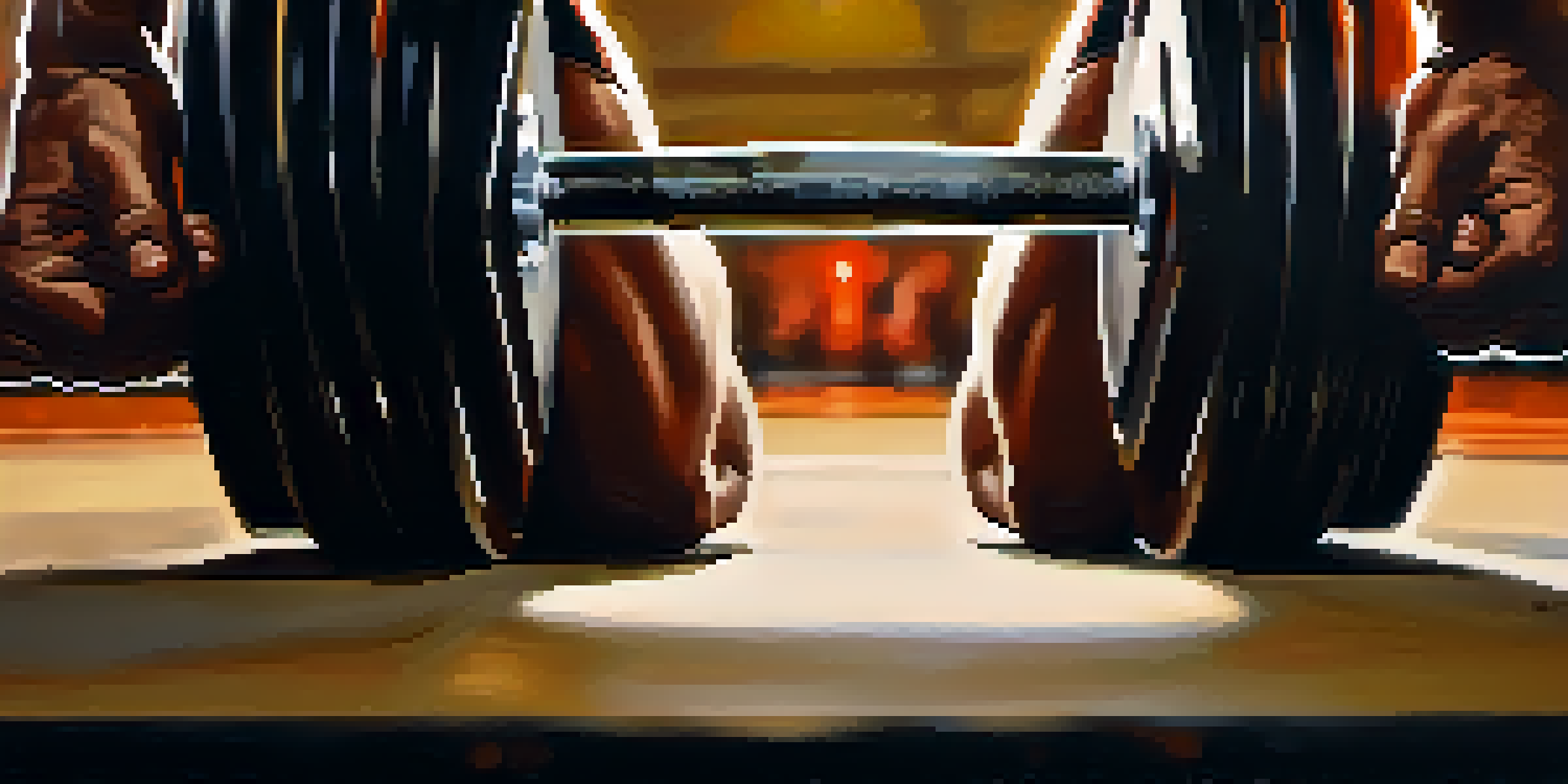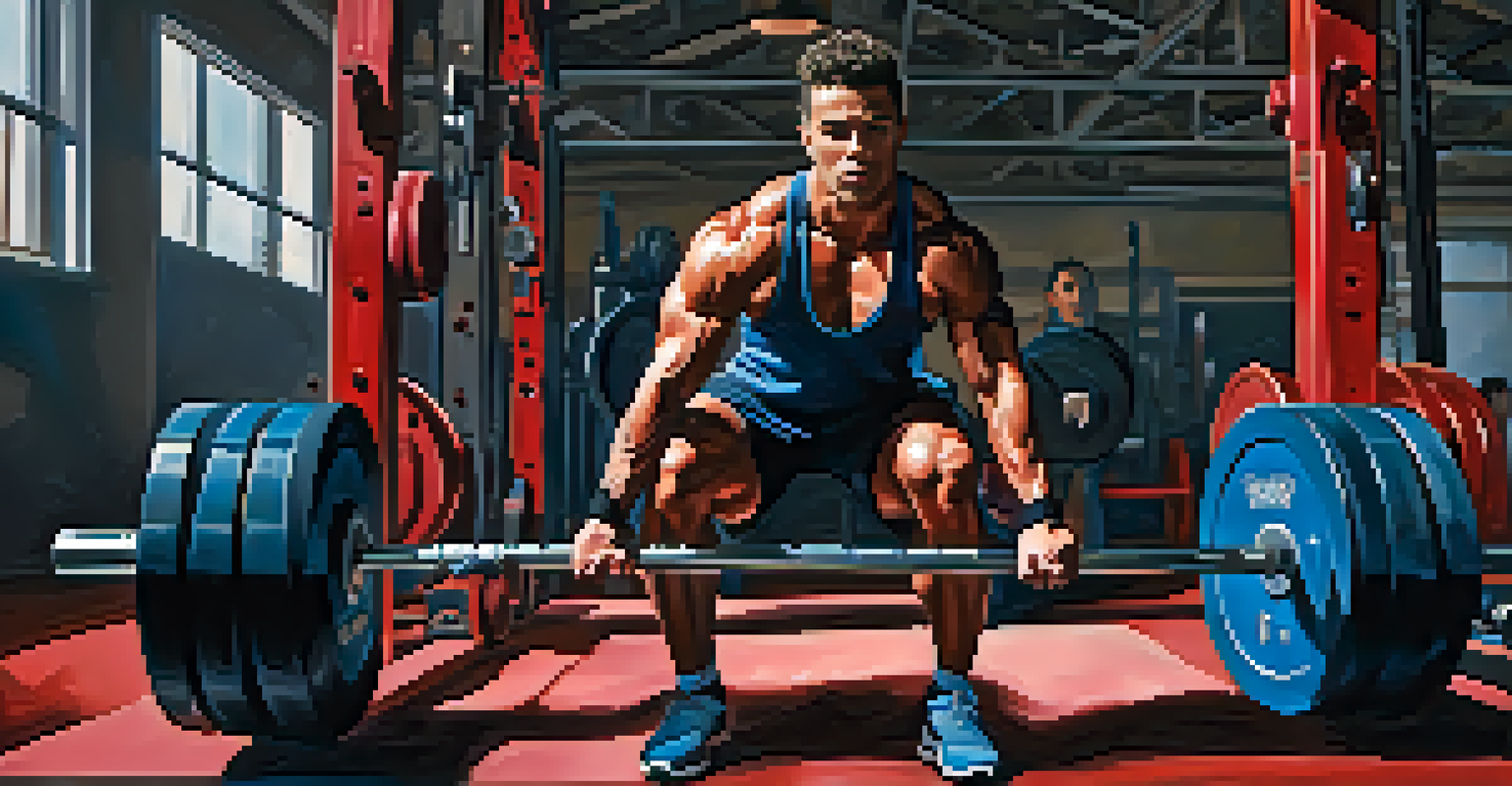The Impact of Hydration on Injury Prevention in Powerlifting

Understanding Hydration and Its Role in Performance
Hydration is crucial for anyone engaging in physical activity, especially powerlifting. When we lift, our bodies require a delicate balance of fluids to function optimally. Dehydration can lead to decreased strength and stamina, hindering your ability to perform lifts effectively.
Water is the source of life, and without it, our performance and health can suffer tremendously.
Moreover, water plays a vital role in regulating body temperature. Lifting heavy weights generates heat, and if you're not hydrated, you may struggle to cool down, which could lead to fatigue or even more serious health issues. Maintaining hydration is not just about performance; it's about keeping your body safe.
Lastly, being well-hydrated enhances nutrient transport in your body. The nutrients you consume play a significant role in muscle recovery and growth, but if you're dehydrated, those nutrients might not reach your muscles as efficiently. This is why hydration is foundational for any athlete.
The Connection Between Hydration and Injury Risk
When you lift weights, your muscles undergo significant stress, and hydration directly influences how well they recover. Studies have shown that even mild dehydration can impair muscle function, making you more susceptible to strains and sprains. Imagine trying to run a car without oil; the parts won't work smoothly, and the risk of damage increases.

In addition, dehydration can affect your joint lubrication. Your joints rely on synovial fluid, which is largely composed of water, to function properly. Insufficient hydration can lead to increased friction in the joints, potentially resulting in injuries during heavy lifts.
Hydration Boosts Performance
Staying well-hydrated is crucial for optimal strength, stamina, and muscle recovery during powerlifting.
Furthermore, cognitive function can be impaired by dehydration, affecting your focus and decision-making in the gym. Not being alert can lead to improper lifting techniques, which is often a recipe for disaster. Staying hydrated ensures you remain sharp and aware, reducing the risk of accidents.
Signs of Dehydration to Watch For
Recognizing the signs of dehydration is key for powerlifters. Common symptoms include thirst, dry mouth, fatigue, and dark urine. If you notice any of these, it’s a clear signal to hydrate before you hit the gym.
Hydration is not a one-time event; it’s a habit that needs to be cultivated for peak performance.
Another indicator is muscle cramps, which can be a direct result of dehydration. If you find yourself cramping during your workouts, it might be time to assess your fluid intake. Staying ahead of these signs can prevent more serious issues later on.
Lastly, pay attention to your overall energy levels. Feeling sluggish or unusually fatigued during your lifts may indicate that your body is not getting enough fluids. It’s essential to listen to your body and adjust accordingly to maintain peak performance.
Optimal Hydration Strategies for Lifters
So, how can powerlifters ensure they're adequately hydrated? A good rule of thumb is to drink water consistently throughout the day, rather than chugging large amounts at once. Carrying a water bottle during training can serve as a reminder to sip frequently.
Electrolyte drinks can also be beneficial, especially during intense training sessions. These beverages help replenish not just water, but also essential minerals lost through sweat. Think of them as your body's way of recharging its battery.
Dehydration Increases Injury Risk
Mild dehydration can impair muscle function and joint lubrication, raising the likelihood of strains and sprains.
Lastly, incorporate hydrating foods into your diet. Fruits and vegetables like watermelon, cucumber, and oranges not only provide hydration but also essential vitamins and minerals that support recovery and overall health.
Pre- and Post-Workout Hydration Tips
Before hitting the gym, it's important to start your workout well-hydrated. Aim to drink at least 16-20 ounces of water a few hours prior to training. This sets a solid foundation for your performance and helps maintain energy levels.
During your workout, aim to sip on water or an electrolyte drink every 15-20 minutes. This can help replace fluids lost through sweat and keep your performance consistent throughout your lifting session. Think of it as a quick pit stop to keep your engine running smoothly.
After your workout, rehydrating is just as crucial. Drink at least 16-24 ounces of water within the first hour post-training to help your body recover. This aids in muscle recovery and prepares you for your next session.
The Role of Individual Needs in Hydration
Every athlete is unique, and hydration needs can vary based on factors like body size, climate, and training intensity. What works for one lifter may not be sufficient for another. It’s essential to tailor your hydration strategies to fit your personal needs.
For instance, heavier lifters may require more fluids than lighter lifters, as they have larger muscle mass and higher sweat rates. Similarly, training in hotter environments can necessitate increased hydration to combat fluid loss through sweat.
Tailor Hydration to Individual Needs
Each athlete's hydration requirements differ based on body size, climate, and training intensity, making personalized strategies essential.
Listening to your body and adjusting your hydration plan accordingly is key. Keeping track of your fluid intake and how you feel during workouts can guide you to find that perfect balance.
Conclusion: Stay Hydrated, Lift Strong
In conclusion, prioritizing hydration is essential for powerlifters looking to prevent injuries and enhance performance. Understanding the importance of fluid intake can make a significant difference in how you feel and lift in the gym.
By recognizing the signs of dehydration, implementing effective hydration strategies, and tailoring your needs, you can protect your body from injury while maximizing your lifting potential. Remember, hydration is not just a supplement; it's a crucial part of your training routine.

So, whether you're a seasoned lifter or just starting out, make hydration a top priority. Your body will thank you, and you’ll be on your way to achieving those lifting goals safely and effectively.